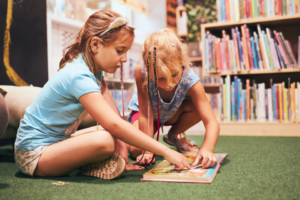
Beyond Pencils and Books: Social and Emotional Learning in School
 There’s more to school than reading, writing, and arithmetic. School is perhaps a student’s first interaction with a social environment outside of his or her own family. It is important that we create environments in which students can grow into social beings who understand how to interact with others, take others’ perspectives, and effectively function within their school “societies,” and ultimately, our society at large. We must look beyond test scores and assessments and work also as facilitators for social, cultural, and emotional wellbeing. Instilling these skills early in life can help young people grow into empathic, accepting adults, which we need more of in our consistently more egocentric society. To begin this process we must:
There’s more to school than reading, writing, and arithmetic. School is perhaps a student’s first interaction with a social environment outside of his or her own family. It is important that we create environments in which students can grow into social beings who understand how to interact with others, take others’ perspectives, and effectively function within their school “societies,” and ultimately, our society at large. We must look beyond test scores and assessments and work also as facilitators for social, cultural, and emotional wellbeing. Instilling these skills early in life can help young people grow into empathic, accepting adults, which we need more of in our consistently more egocentric society. To begin this process we must:
Promote difference: People can draw attention to difference in both positive and negative ways. It is our obligation as educators to teach difference solely in a positive light. Small things like “heritage projects” or a day in which students share food from their cultures can go a long way toward promoting difference and understanding that uniqueness is a powerful vehicle through which to broaden young peoples’ perspectives of the world around them. Furthermore, learning at a young age that difference is to be embraced and not feared is elemental for life, work, and relationship success. For young students, there are, of course, classic stories like “The Ugly Duckling” or “ to reinforce this idea. Here is a link to some more current kids’ books that aim to reinforce positive values:
http://www.goodnet.org/articles/25-childrens-books-that-teach-kids-meaningful-values
Encourage sharing stories: In previous posts, I’ve written about the power of narrative. I firmly believe that sharing personal and family stories can lead to perspective-taking, the ability to view a situation from another’s point of view. Ellen Galinsky, author of Mind in the Making: The Seven Essential Life Skills Every Child Needs, reminds us that teaching life skills to children can be just as important as teaching school readiness skills.* Indeed, perspective taking can lead to emotional competence in social situations and the ability to work well with others by standing in their shoes rather than judging or reacting. This life skill has value well beyond the classroom, as all of us who are out in the “real world” know.
Build a nurturing environment: In order to be able to share stories and promote difference comfortably, it is vital that we create environments in which students feel they can coexist freely and without fear of judgement or humiliation. Strive to make your classroom a “judgement-free zone.” Educator and blogger Jeffrey Billard puts it this way: “I let [students] know in a firm, yet gentle way, that everyone in the classroom is valued and that laughing at someone, putting them down, or just making a gesture (like rolling of the eyes) will not be part of our classroom practice. If it does happen, I simply stop the activity and use the teachable moment to remind students of our classroom practices.”** The environment has to be established before we can implement any of our ideas about openness and sharing. It is the bedrock.
Educators are in a unique position to reach students far beyond just the numbers and letters of classwork and homework assignments. By building a nurturing environment and encouraging difference and empathy, we are setting students up for life success.
*http://msue.anr.msu.edu/news/perspective_taking_another_essential_life_skill
**http://teachingthroughthearts.blogspot.com/2008/09/creating-safe-container-and-judgment.html
Written by Phil Lane



